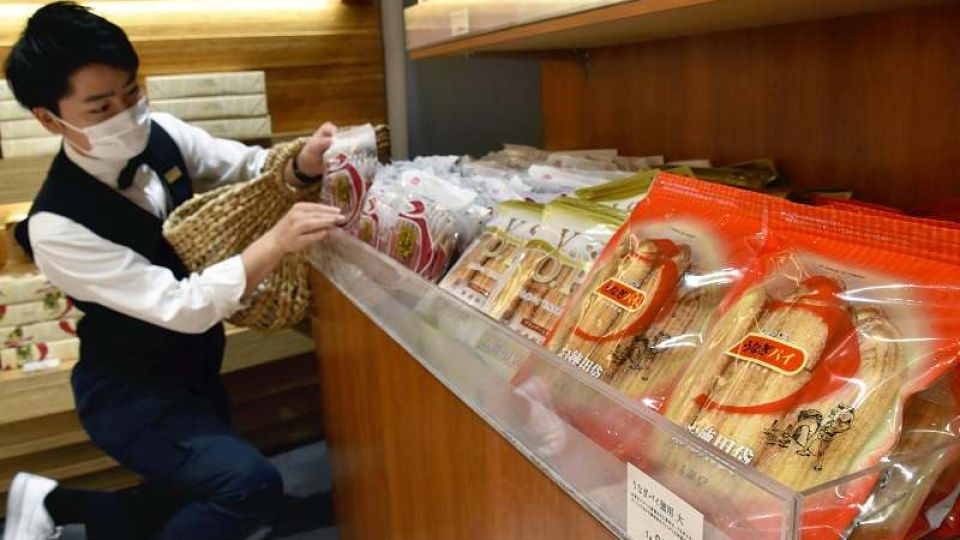May 11, 2022
TOKYO – As prices for flour and other materials soar worldwide, local confectionery makers are being forced to raise their prices around Japan.
Already hit hard by a sharp drop in tourists and souvenir demand in the face of the coronavirus pandemic, confectioners are increasingly concerned that they may face additional price hikes due to the deepening turmoil in Ukraine. A long-established sweets maker and distributor lamented the situation, saying, “We can’t handle this on our own anymore.”
Sweets Bank Shop Shunkado in the suburbs of Hamamatsu was crowded with tourists during this year’s Golden Week holidays, the first to take place without COVID-related restrictions since the pandemic began. Many visitors were buying Unagipie Pastries, the signature confectionary of Shunkado Co., which runs the shop.
In April, Shunkado raised the price of the standard box of 12 pieces to ¥1,058 from ¥962, the first increase in seven years. To some customers it came as a surprise, but the negative impact was minimized by the large number of tourists at the store during the holidays, according to store manager Ryota Suzuki, 24.
“In addition to flour, the prices of packaging wrap and boxes have also gone up due to rising oil costs,” said a Shunkado official, adding that the company’s cost-cutting measures and other steps to maintain prices had “reached their limit.”
Kotobuki-ya, a confectionery maker in Shibukawa, Gunma Prefecture, also in April raised by nearly 10% the price of its Yunohana Manju, a bun known as a local specialty at the Ikaho hot spring resort in the city.
According to the Shibukawa Ikaho Onsen Tourism Association, the resort had about 540,000 overnight guests in 2021 — the lowest ever and half the number it had before the pandemic. Sales at souvenir shops have been sluggish as a result, and soaring prices of raw materials have put a damper on the situation.
Akafuku Co., a long-established Akafuku Mochi maker in Ise, Mie Prefecture, and Meigetsudo Co. in Fukuoka, known for its Hakata Torimon, also had to raise the prices of their sweets.
However, some confectioners have devised ways to reduce the burden of higher prices. In April, Ariake Co., a Yokohama-based sweets maker known for its Harbour series, raised the price of its mainstay Yokohama Harbour Double Marron by ¥81 to ¥972 for a set of five pieces. Around the same time, the maker also released on a limited basis a set of six pieces for the price of five, which has sold well. Using it as a good opportunity to promote its products, the company has worked to promote its wares such as by talking about the manufacturing process on the sales floor.
Well-established confectionery maker Nishikido Corp. in Hiroshima is determined to keep the price of its signature Momiji Manju at ¥100 each for the time being. This is partly because the maker already raised the price of its buns by ¥5 three years ago. Nevertheless, its situation is just as severe as others in the industry.
“We’re somehow bearing up, but if the international circumstances and other factors remain unstable, we will have no choice but to consider a price increase,” said a company official.

